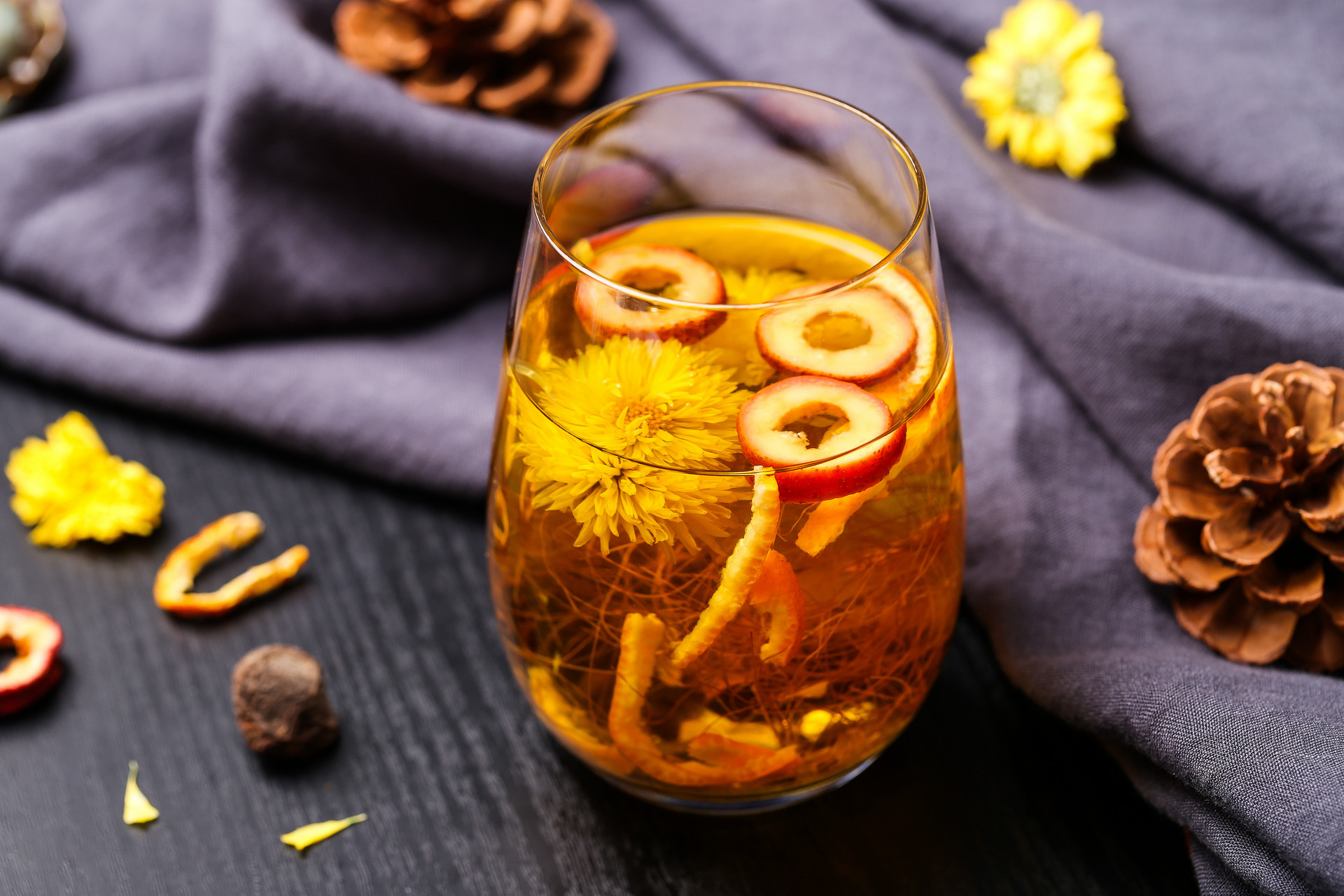Chrysanthemum Tea
Chrysanthemum Tea Introduction:
Chrysanthemum tea is a herbal tea made from chrysanthemum flowers. The process of making chrysanthemum tea includes picking fresh flowers, drying them in shade, steaming and drying them again. According to ancient records, chrysanthemum flowers have a sweet and bitter taste and a slightly cooling nature. They have the effects of dispersing wind, clearing heat, improving liver function, improving eyesight, and detoxifying and reducing inflammation. Chrysanthemum tea originated in the Tang Dynasty and was widely used in people's daily lives during the Qing Dynasty.
The Effects of Chrysanthemum:
Drinking chrysanthemum tea can help alleviate acne caused by internal heat. Chrysanthemum has the effects of clearing the liver, improving eyesight, and reducing heat.
1. Anti-pathogen effect. Chrysanthemum has certain inhibitory effects on Staphylococcus aureus, beta-hemolytic streptococcus, and Salmonella in vitro. Its water extract also has inhibitory effects on some common pathogenic fungi on the skin. At high concentrations, it also has antiviral and anti-spirochete effects in vitro.
2. Enhancing the resistance of capillaries. Chrysanthemum extract can reduce the diffusion of local toluidine blue after intradermal injection of histamine in mice, indicating that it can inhibit the permeability of capillaries and has anti-inflammatory effects.
3. Fever-reducing effect. It has a strong inhibitory effect on Staphylococcus aureus, Escherichia coli, and Shigella dysenteriae.
4. It has a significant effect on the cardiovascular system. It has a significant effect on dilating coronary arteries and increasing coronary blood flow. It has good therapeutic effects on elderly diseases such as coronary heart disease, hypertension, and hyperlipidemia, thus promoting health and longevity. Significant achievements have been made in the treatment of common diseases in the elderly in China.
5. It has a calming effect on the central nervous system and also has detoxifying effects.
Chrysanthemum tea is a popular beverage because it is not only delicious but also has the effects of clearing the liver, improving eyesight, and reducing heat and detoxification. However, chrysanthemum tea also has certain contraindications. There are 5 types of people who should not drink chrysanthemum tea.
There are 5 types of people who should not drink chrysanthemum tea:
1. The elderly and children
Although it may seem that chrysanthemum tea can lower blood pressure and cholesterol in the elderly and have no harm when consumed in summer, the elderly have weakened digestive function and weaker spleen and stomach. Drinking chrysanthemum tea may cause gastrointestinal diseases, so the elderly should be cautious.
Children are in a period of growth and development, with a strong yang energy. Drinking chrysanthemum tea can reduce yang energy, so it is best to avoid it.
2. Pregnant women
Chrysanthemum tea has a cold nature and a sweet taste, and it has a great effect in removing internal heat. However, pregnant women have low immunity and weak spleen and stomach. Drinking chrysanthemum tea can easily stimulate the intestines and stomach, causing symptoms such as abdominal pain and diarrhea, which is not conducive to the healthy growth of the fetus.
3. People with allergies
Some people may be allergic to chrysanthemum tea, and drinking it can cause allergic reactions such as skin redness and rashes. Therefore, people with allergies may have adverse effects from drinking chrysanthemum tea, which is not good for their health.
4. People with a cold constitution
People with a cold constitution are afraid of cold, have weak bodies, weak spleen and stomach, and low immunity. Even in summer, they may experience symptoms such as cold hands and feet and diarrhea and gastrointestinal discomfort. Chrysanthemum tea has a cold nature, which will only aggravate their symptoms and be detrimental to their health.
5. People with typhoid fever and colds
In general, people with typhoid fever and colds are caused by catching a cold, and the nature of chrysanthemum tea determines that it is not suitable for such patients to drink. In addition, those who have a sore throat along with a cold should not drink chrysanthemum tea either.
Because chrysanthemum tea stimulates gastric acid secretion, it exacerbates the inflammation of the throat, delays the patient's recovery time, and reduces the quality of recovery.



![[The Risks of Eating Hawthorn During Pregnancy]](https://tcmmaintenance.com/uploads/20240715/97742b67f97f94c495ae1389337c5c41.jpg)








